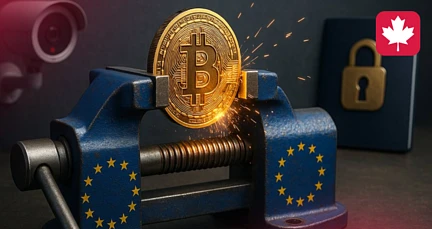
MiCA vs. CryptoCasino: New EU Rules – How to Play Next?
The European Union is tightening the screws in the world of cryptocurrencies, and stablecoins are in the crosshairs – the blood and flesh of many crypto casinos. The MiCA (Markets in Crypto-Assets) regulation is already on the doorstep, and it is a radical change in the rules of the game. For some, this is the collapse of the usual schemes, for others – new opportunities. so that deposits do not turn into endless "pending".
Content:
-
Checklist for the player: "deposit in three steps so as not to get stuck in pending"
-
Alternatives: Lightning, PayPal stablecoin, on ramp via EU banks
What is MiCA?
Imagine that until recently, the world of cryptocurrencies in the EU was a kind of Wild West: everyone set their own rules, and players and investors acted at their own risk. The regulators slumbered, but thunder struck. MiCA is an attempt by the European Union to restore order, to introduce uniform rules for all participants in the crypto market, from issuers of crypto assets and exchanges to wallet operators and, indirectly, online casinos that accept crypto.
The main goal of MiCA is to protect consumers, ensure financial stability and stimulate innovation (although the latter can be argued, given the stringency of some regulations). For the gambling industry, this means, first of all, new requirements for the use of stablecoins and working with payment service providers (PSPs). The regulation comes into force in stages, and key changes in stablecoins are expected as early as mid-2024, and the full application of most of the rules is expected by the end of 2024 - beginning of 2025. It will no longer be possible to ignore this.
Linked materials
Which stablecoins "go under the knife": USDT vs USDC/EURC
At the heart of the problem for crypto casinos is the new rules for stablecoins, especially those that are not pegged to EU currencies or do not have clear authorization within the EU. MiCA divides stablecoins into two main categories: electronic money pegged tokens (EMT) and asset-pegged tokens (ART).
Problem candidates:
- USDT (Tether): The most popular stablecoin in the world and a frequent guest in the cash registers of crypto casinos. However, with a high degree of probability, it is USDT that will face the biggest problems in the EU. MiCA imposes strict restrictions on the use of stablecoins that are not denominated in euros or other currencies of EU countries, unless their issuers obtain a special license in the European Union. Tether has historically been slow to fully transparent its reserves and obtain European licenses. Moreover, some European banking partners of crypto exchanges have already begun to restrict operations with USDT, fearing impending sanctions. Prediction: high risk of an actual ban or severe restrictions for European casino users.
Conventionally "good" guys (with nuances):
- Circle's USDC (USD Coin) and EURC (Euro Coin): Circle is actively working to comply with MiCA requirements. EURC, as a stablecoin denominated in euros and issued by a company seeking licensing in the EU (Circle has received a Conditional Virtual Asset Service Provider (VASP) license in France), has significantly better prospects. USDC, although pegged to the US dollar, is also issued by a company that has shown a willingness to engage in dialogue with regulators. However, there are nuances here as well: MiCA introduces transaction quotas for large stablecoins that are not denominated in euros if their daily volume exceeds certain thresholds (for example, 200 million euros per day and 1 million transactions). This can create operational difficulties. Prediction: USDC and especially EURC are more likely to remain available, but with possible volume restrictions and the need for casinos to work only with licensed issuers.
Key point for casinos and players: The use of unauthorized or non-MiCA compliant stablecoins will become highly risky. Platforms that continue to work with "gray" stablecoins may face blocking by banks and PSPs, and players may face freezing of funds.
 How to Play Book of Dead and Not Lose All Your Money: The Best Casinos to Play with Maximum RTP!
How to Play Book of Dead and Not Lose All Your Money: The Best Casinos to Play with Maximum RTP!Linked materials
How operators and PSPs are already reacting
The news about MiCA did not come as a bolt from the blue for major market players. Many payment service providers and custodial services have already begun to adapt, albeit at different speeds and degrees of publicity.
- BitGo: As one of the largest cryptocurrency custodians, BitGo has always focused on regulatory compliance. While there may be few public statements directly linking their operations to MiCA's impact on stablecoins in gambling, the company's overall strategy is focused on dealing with regulated assets. BitGo is expected to support MiCA-compliant stablecoins and possibly tighten procedures for those in the gray area. casinos using BitGo to store their crypto assets, this means that the portfolio of accepted stablecoins must be revised in favor of EURC or other authorized EMTs.
- Binance Pay: Binance, as one of the largest crypto exchanges, is under scrutiny from regulators around the world, and the EU is no exception. Binance has already announced plans to comply with MiCA requirements. This includes changes to the stablecoin listing for European users. For example, there have been reports of a possible delisting or restriction of operations with "unauthorized" stablecoins for EU users. Binance Pay, as a payment solution, will be forced to follow the general policy of the exchange. This may mean that payments via Binance Pay using, for example, USDT in European crypto casinos will become impossible or very difficult. The exchange actively promotes the use of stablecoins that comply with local regulations and may offer alternatives such as euro-denominated stablecoins or other payment methods.
The general trend is that PSPs and operators operating in the European market will be forced to "clean" supported stablecoins. Priority will be given to those who have received or are in the process of obtaining authorization in the EU. This will inevitably lead to a narrowing of choices for casinos and their customers, especially for those who are used to USDT. Many platforms are already starting to inform their European customers about the upcoming changes and possible restrictions risk operating activities and customer funds.
Checklist for the player: "deposit in three steps so as not to get stuck in pending"
New rules – a new headache? It's possible. But forewarned is forearmed. To prevent your deposits at your favorite crypto casino from turning into a waiting nightmare or, worse, getting stuck tightly, here's a simple three-step checklist:
- Step 1: Check the "whiteness" of the stablecoin and the casino (before depositing!).
- Which stablecoin are you going to use? Forget about the principle "if it's in the cashier, then everything is OK". Check with the casino's support (or look for information on their website) what stablecoins they recommend for EU players in light of MiCA. Particular attention is paid to USDT. If the casino continues to actively promote it without any reservations for Europeans, this is a red flag.
- Study the casino's position on MiCA: Serious platforms are already informing players about upcoming changes. If there is zero information, this is a reason to think about the reliability of the operator.
- Preference for regulated options: Choose stablecoins denominated in euros (e.g., EURC) or those whose issuers have explicitly declared authorization in the EU (e.g., Circle's USDC).
- Step 2: Evaluate your transaction path (from where and to).
- Your exchange/wallet and the EU: If you are sending stablecoins from an exchange, make sure that it complies with EU regulations. Many major exchanges are already imposing restrictions on European users on "unauthorized" stablecoins.
- Casino PSP: Find out (if possible) through which payment service provider the casino processes crypto deposits. Some PSPs may be stricter in enforcing MiCA than others.
- Limits and Fees: Due to MiCA and possible reduced liquidity for some pairs, please pay attention to the new deposit/withdrawal limits and possible changes in fees.
- Step 3: Be prepared for additional checks and have a plan "B".
- KYC/AML has not been canceled: MiCA is strengthening customer identification requirements. If you have played relatively anonymously before, be prepared for the fact that the casino or PSP may request additional documents.
- Test Deposit: If you're unsure, start with a small test deposit to check how things work before sending a large amount.
- Keep alternatives handy: Don't put all your eggs in one basket (or one stablecoin). Research what other deposit methods the casino offers and be prepared to take advantage of them (more on alternatives below).
Alternatives: Lightning, PayPal stablecoin, onramp via EU banks
Banning or restricting popular stablecoins is certainly a blow to the usual schemes. But a holy place is never empty. The industry is already looking for and offering alternative ways for deposits and withdrawals to crypto casinos in the EU jurisdiction.
- What is this? A second-layer payment protocol for Bitcoin that allows for fast and cheap transactions.
- Pros for casinos: Instant deposits, minimal fees, increased throughput compared to the main Bitcoin network. This can be an attractive alternative for those who prefer to use BTC.
- Cons and nuances: Not all casinos have integrated Lightning yet. Players need to have a wallet that supports Lightning. And, of course, this solution is only for Bitcoin, not for stablecoins. However, given the pressure on the latter, BTC via Lightning may regain popularity.
- What is this? PayPal has launched its own stablecoin, PYUSD, pegged to the US dollar. Although it is dollar-based, PayPal, as a large regulated financial institution, has a better chance of obtaining the necessary licenses to operate in the EU than some other issuers.
- Pros for casinos: Potentially high level of trust from users and regulators (if PayPal ensures MiCA compliance). Integration with the already existing huge PayPal user base.
- Cons and nuances: PYUSD is still a new player in the market, and its widespread adoption of casinos and availability in the EU is a matter of time and regulatory approvals. In addition, fees and terms of use may differ from the usual crypto transactions.
- What is this? Services that allow players to buy cryptocurrency (including permitted stablecoins or Bitcoin/Ethereum) directly using their bank accounts in the EU. These can be both integrated solutions on the casino side and third-party licensed platforms.
- Pros for casinos: Full compliance with EU banking regulations, transparency of transactions. For players, it is a familiar way of using a bank account.
- Cons and nuances: Can be slower than direct crypto transfers. Fees may be higher. Not all players will want to directly "expose" their bank transactions in favor of the casino, although with the strengthening of AML requirements, anonymity in any case becomes less.
- In addition to Bitcoin through Lightning, casinos may be more active in promoting other established cryptocurrencies, such as Ethereum, Litecoin, etc.
The Future of Regulated Payments in Crypto Casinos
The regulation of MiCA undoubtedly "hurts" those who are used to the gray zone and anonymity in crypto gambling. Dropping support for unregulated stablecoins like USDT (if it doesn't adapt) will affect a significant portion of the market. However, in the long term, these changes aim to create a safer, more transparent and stable environment for both players and operators.
Casinos that switch to MiCA-compliant stablecoins in advance and comply with EU regulatory requirements will be in a better position. For players, this means the need to be more knowledgeable, choose payment instruments carefully, and be prepared for increased verification requirements on licensed European sites. The crypto casino market in Europe is entering an era of maturity where regulation is becoming an integral part of the game.




celese Haha, classic! First they screwed over the players, then the license turned out to be fake, and now they’re trying to undo everything. A total circus. Yeah, everything will just get bought. They’ll pay whoever they need in Curaçao and get a new license. Money rules everything, especially in this industry.



Mangarin4ik The section about how casinos fire VPNs is a gun. I've never thought about WebRTC and the time zone. Author, thank you, you may have just saved my next deposit.




































Those who work legally will survive.
minus anonymity
Binance is clearly already preparing the ground. Recently, I wanted to replenish my casino balance through Binance Pay - it issued "transaction is not possible for your region". Apparently, the restrictions have already begun.
I hope this will make the casino be at least a little more honest.
Like, if I use USDT, then my money can just get stuck and I won't withdraw anything?? What kind of jokes are these
You got it right. MiCA is like a parent who came to a party with friends and started patting everyone on the head, but also took the beer.
minus anonymity
Am I the only one who didn't understand anything?